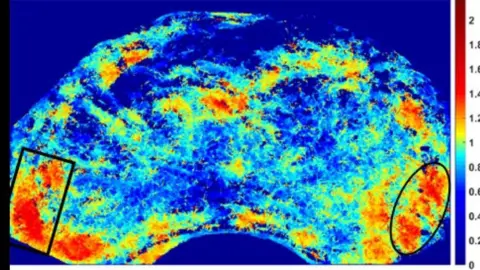 BBC
BBCResearchers say they are encouraged by trials of a new method for detecting prostate cancer in men.
It is hoped that the approach developed at Heriot Watt University in Edinburgh could lead to faster diagnosis and earlier preventative treatment.
Prostate cancer is the most common cancer among men in the UK, with one in eight diagnosed with the disease during their lifetime.
The process uses existing ultrasound equipment, widely available in most hospitals, instead of expensive MRI scanners that can lead to long waiting lists and delays in treatment.
The test involves injecting a solution containing millions of tiny, harmless microbubbles into a vein.
These bubbles travel through the patient’s bloodstream to the prostate and are tracked using ultrasound technology.
Impaired blood flow in cancerous tissue is demonstrated by the solution and appears on ultrasound.

Research scientists from the university, working alongside doctors from Edinburgh’s Western General Hospital, have carried out preliminary clinical trials.
They believe the signs are “extremely encouraging”, with a prostate tumor detection rate of 94%.
Trials are expected to continue – although, in reality, it could be between three and five years before the technique can be used in a clinical setting.
Professor Alan McNeill, consultant urological surgeon at Western General Hospital, said the initial results of the trial provided useful information for the diagnosis and treatment of prostate cancer.
He said: “The technology has the potential to significantly improve diagnostic accuracy, helping clinicians like me perform more targeted biopsies and even target treatments with greater precision.
“I can expect this to benefit treatments like focal therapy by allowing us to identify and treat cancerous tissue with greater precision.
“Almost every week, my colleagues and I meet men in their 50s and early 60s who have advanced prostate cancer that leaves them with fewer treatment options.”
 Getty Images
Getty ImagesProstate cancer is not always life-threatening and can be cured if detected early enough.
There is no screening program for prostate cancer in the UK, unlike those for breast, bowel and cervical cancer.
Instead, it is up to men to request a prostate-specific antigen (PSA) blood test from their GP once they are over 50.
These PSA tests are then used to decide whether or not a patient should have an MRI.
Last year, six-time Olympic cycling champion Sir Chris Hoy called for a review of prostate cancer screening tests following his own terminal diagnosis.
Hoy announced in August last year that he had been diagnosed with primary prostate cancer and could be given between two and four years to live.

Gary Tait, 61, from Edinburgh, was treated for prostate cancer five years ago after his wife, a nurse practitioner, encouraged him to see his GP.
He now chairs the Edinburgh and Lothian Prostate Cancer Support Group, which fully supports the development of the new technology.
Mr Tait says the new test increases the chance of men being diagnosed and treated earlier.
He said: “Being diagnosed and treated for prostate cancer is an incredibly anxious time, so it is very positive to see the results of these trials which indicate that the new ultrasound technique could lead to a more accurate diagnosis of prostate cancer.
“From the perspective of men who are unaware of the development of a tumor in their prostate, this improved diagnostic method could lead to earlier treatment, which would improve the chances of good outcomes.”



